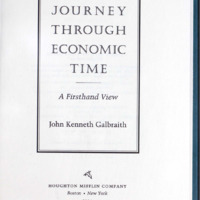-
Title
-
A journey through economic time : a firsthand view
-
Description
-
John Kenneth Galbraith exhibits unmatched insight and broad scope - from World War I and the Russian Revolution to the implications of Communism's fall, from the "superbly insane decade of the twenties" and the Great Depression to the Reagan era and beyond. Whether he is analyzing the advent of Keynesian theory or the end of colonialism and the emergent Third World, Galbraith epitomizes the hindsight and the vision of one who has been an active and outspoken participant in the world's economic history. He writes with authority about the forging of Kennedy's New Frontier and Johnson's Great Society and examines the consequences of the "unintended history of the 1980s." Keenly observed and brilliantly composed, A Journey Through Economic Time is the crowning achievement of a remarkable career, a comprehensive and accessible view of twentieth-century economic and political history that will be read and referred to for years to come.
-
Identifier
-
487376
-
395637511
-
Creator
-
Galbraith, John Kenneth
-
Source
-
Brian Lamb Booknotes Collection
-
Catalog record
-
Language
-
eng
-
Date
-
1994
-
Program air date: November 13, 1994.
-
Publisher
-
Houghton Mifflin
-
George Mason University. Libraries. Special Collections & Archives
-
Text
-
Transcription of Annotations
Note on front endpapers: Monopoly. Price Controls. Inflation. W.W.I. W.W.II--The Marshall Plan. Karl Marx. Engles. Why are leaders defeated after victory? War and money/Income tax 1913. John Manard Keynes/Franklin Graham suicide. Joseph Schumpeter-Austrian. Alfred Marshall 1931- I KK armed at Berkeley. Crash of 1929-most important event in life. Adlai Stevenson, 1952. Soviet Union-collapse. Economic -consumers. Human rights. Kennedy-Joseph Jr.-Keynesian. Lowering tax-not my idea. GEW-Galbraith Early Warning Signal. Underlinings/notes: Underlinings: Book on what he saw--learned. Capitalism. Government seen as enemy of private enterprise. Communism. WWI Great War, WWII its last battle. Grew up in rural Canada. Lists WWI statistics on forces, killed, wounded. Lamb highlights names like: Woodrow Wilson, Winston Churchill, President Roosevelt, Mussolini, Hirohito, Lyndon Johnson, George Bush, Ludwig von Mises, Friedrich von Hayek, Fritz Machlup, Joseph Schumpeter. Galbreith's education. Keynesian community. Impact of Marshall Plan. Stable government prime essential of economic development. Notes: Fresh country air," "rate of growth," " Crises, panics, depression, recession," "Karl Marx," "Great turning point," "Marx, Smith, Keynes," "WWI," "WWII," "Socialism," "Anti-tax law," "U.S. Budget," "Assistance programs," "free education,"" "honest government," "arms trade," "Soviet Union."
-
Subject
-
"Economic history--20th century."
-
"World politics--20th century."
-
Relation
-
Original Booknotes interview
-
Rights
-
This work may be protected by copyright laws and is provided for educational and research purposes only. Any infringing use may be subject to disciplinary action and/or civil or criminal liability as provided by law. If you believe that you are the rights-holder and object to Mason’s use of this image, please contact speccoll@gmu.edu.
 487376.pdf
487376.pdf